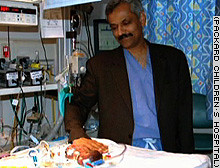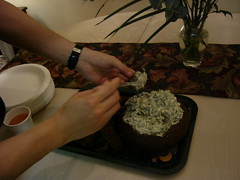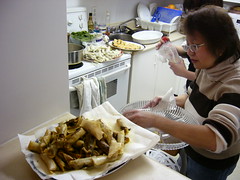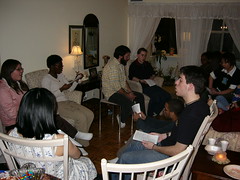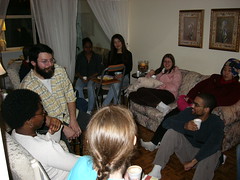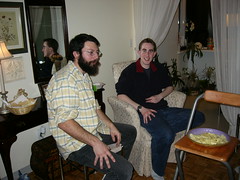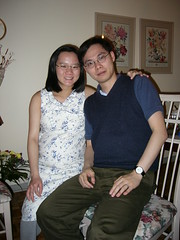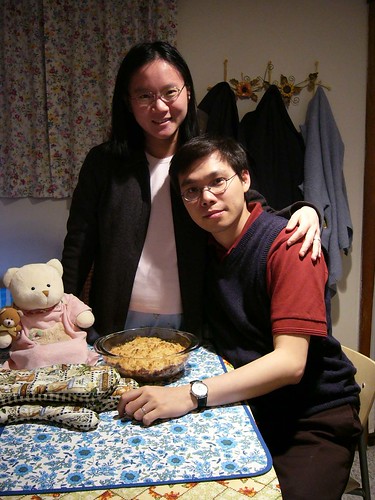"Shadrach, Meshach and Abednego replied to the king, "O Nebuchadnezzar, we do not need to defend ourselves before you in this matter. If we are thrown into the blazing furnace, the God we serve is able to save us from it, and he will rescue us from your hand, O king. But even if he does not, we want you to know, O king, that we will not serve your gods or worship the image of gold you have set up." ~ Daniel 5:16-18 (Emphases mine)

Since the tsunami struck various South Asian countries on Boxing Day 2004, stories of miraculous deliverance and recovery have been circulated by religious groups. The questions would be: are they true? and for the ones that are, what significance could we properly derive from them? The following is one such account (or testimony) from Meulaboh taken from an email letter forwarded to me by a friend.
We know that 80% of the town of Meulaboh in Aceh was destroyed by the tsunami waves and 80% of the people also died. This is one of the towns that was hit the hardest.
But there is a fantastic testimony from Meulaboh. In that town are about 400 Christians.
They wanted to celebrate Christmas on December 25th but were not allowed to do so by the Muslims of Meulaboh. They were told if they wanted to celebrate Christmas they needed to go outside the city of Meulaboh on a high hill and they can celebrate Christmas there.
Because the Christians desired to celebrate Christmas the 400 believers left the city on December 25th and after they celebrated Christmas they stayed overnight on the hill. ...The 400 believers were on the mountain and were all saved from destruction.
Now the Muslims of Meulaboh are saying that the God of the Christians punished us for forbidding the Christians from celebrating Christmas in the city. Others are questioning why so many Muslims died while not even one of the Christians died there.
Had the Christians insisted on their rights to celebrate Christmas in the city, they would have all died. But because they humbled themselves and followed the advice of the Muslims they all were spared destruction and can now testify of God's marvelous protection.
This is a testimony of the grace of God and the fact that as believers we have no rights in the world. Our right is to come before God and commit our lives to Him. Our right is kneeling down before the Lord almighty and commit our ways to Him. He is our Father and is very capable to care for His children. Praise the Name of the Lord.
Bill Hekman
Pastor, Calvary Life Fellowship in Indonesia
Eager to check out the credibility of this testimony, which certainly would be encouraging to the faith of Christians (see comments on this later in this post), I thought that it might be a good idea to
snopes it, to begin with. The verdict: False. Now does that mean that all the so-called facts of this testimony have all been fabricated?
Firstly, the researcher Barbara Mikkelson attempts to clarify that one-third to one-half of the pre-tsunami population of 60,000 (that is, not the alleged 80%) lost their lives. Secondly, such a newsworthy story would certainly not have gone unreported or unrepeated in all the deluge of relief work done there--if it were indeed true. One might reasonably expect that some in the 400 would be ecstatic or thankful enough about their Christmas miracle to share it with Christian aid workers who would be more than happy to "trumpet" this news. But apparently, none of this happened. Thirdly, attempts to explain this absence of reporting by attributing it to the bias of a secular media also seem weak as even the Catholic News Service failed to mention the miraculous survival of the city's Christians in their report on conditions in Meulaboh. Fourthly, though there is indeed a pastor by the name of Bill Hekkman of the fellowship mentioned, Mikkelson's attempt to directly contact the putative writer of this testimony have apparently proven futile. She adds, though, that this is not surprising given the present conditions in Indonesia.
All taken, unless we have reliable sources other than that of Bill Hekkman's, Mikkelson seems to have a fairly good case. The most that one may responsibly say is that this testimony
might not be true. Now, I do not claim to have the slightest idea why someone might want to smear the name of a pastor serving in Indonesia with such fabrications, or, if he knows about it and knows it to be false, why he is not sending out a desperate corrective or apology.
My concern is with Mikkelson's suggestion that Christians are, perhaps, most prone to search for and create such comforting tales, casuistic fairy tales which are then "often immediately accepted as truth because they provide a reason for the sudden great loss of life that is easy to comprehend... Most comforting of all, they demonstrate that the faithful will always be protected from harm by a loving and just God. ...It is far more comforting to believe in an avenging God who strikes down wrongdoers even as He protects the righteous than it is to make one's peace with the concept of disaster not picking its victims." Thus, in this formulation, Christians (or the religious in general) come up looking like naive, gullible weaklings, to say the least. Let me add that
if she is correct in this depiction of Christians, then they are more than just gullible weaklings--the creators of these 'facts' they know to be false show nothing of the integrity and rectitude required of Christians as commanded in the Bible.
There are two issues at hand: 1) the facts (mainly, that about 400 Christians forbidden to celebrate Christmas in the city did so on the hill, and so escaped the tsunami) and 2) the interpretation of these facts (mainly, that the faithfulness, and humble submission of the Christians to the Muslim authorities made God pleased to deliver them from the tsunami; the larger principle being, that God preserves His own). The preceding paragraphs have sought to address the first issue. Let us conclude for now that it does not seem like a well-documented or very reliable piece of reporting, even if it might be true. Let us focus on the second issue, which is the more important one with much broader significance.
Let us assume that the facts are correct. What then? Most of us are aware that the same set of facts can yield more than one interpretation. Can we judge between the validity of these differing interpretations, and say that one has more warrant than the other? On one level, we can of course do so. (I shall speak from a Christian perspective, and use Christians as examples, for then I can speak from better knowledge) For instance, compare an interpretation that views these facts as proof that God exists and that "the faithful will always be protected from harm by a loving and just God," and another that views these facts as being consistent with Bible teaching that God does sometimes preserve His own in certain ways in accordance with His sovereign will and pleasure. I would say the second one sounds more plausible, more reasonable. "Proof" is just one of those words that do not sit well with our questioning minds and the plain facts as we see them with human eyes. There are also, needless to say, too many counter-examples of similar form to "prove" the contrary position--that God does not exist (e.g. Christians have also died in this tsunami and countless other horrendous tragedies that have occurred throughout history). The first interpretation is thus not good, not too helpful. Now the question is: when someone testifies to God's goodness in the believer's life (such as in this Meulaboh case), is he or she putting forward the first (as charged by Mikkelson), or the second, interpretation?
The putative writer of the Meulaboh testimony attributes the supposed survival of the Christians to their humble submission to the advice of the Muslims. "Had the Christians insisted on their rights to celebrate Christmas in the city, they would have all died." Insofar as "Bill Hekkman" is addressing Christians, those who share his worldview, he is fully warranted to testify that God has in this instance, shown His mercy to those who have been faithful. The Bible does teach that God rewards the faithful and punishes the wicked. This formulation, however, is
not to be understood in simplistic fashion--for instance, that no harm will befall the faithful; that only bad things happen to non-believers; that all bad things that happen to non-believers are punishments from God; that the "faithful" are always good, and morally superior to non-believers... (the list of misconceptions goes on, and this is not the place for a more comprehensive theological discussion--nor am I well qualified to present such one) The biblical teaching has to be understood in the context of all the Bible verses that address this issue.
"Bill Hekkman" is also justified in testifying that God "is our Father and is very capable to care for His children." It is true that our omnipotent God is more than capable to care for His own. God is not bound, however, like an automaton or well-functioning vending machine, to always deliver His children. Accounts of matyrdom, and the suffering and death of believers abound in the Bible and in church history, along with accounts of God's preservation of His own. The verses from Daniel quoted at the beginning of this post illustrate well the biblical position on this matter. God is sovereign, and His ways are not always easily understood by human minds; what He does promise that "all things work together for the good of those who love Him, and who are called according to His purpose." (Romans 8:28) He allowed Stephen, one of the first deacons of the early church in the Book of Acts, to be stoned to death--to the glory of God, as a witness to many (Acts 7).
So we see that God does keep His own (they are kept in a much more profound way--the eternal salvation of their souls) , and does all for their good and for His eternal purposes. Can we attribute the deaths of non-believers to God punishing their wickedness? Put another way, are Christians saved because they are of themselves good or better, than their non-believing counterparts who perish? No. The Bible is absolutely clear on that score. Not even the saintliest amongst us humans could ever dream of meriting God's favour and heaven. "For by grace you have been saved through faith; and that not of yourselves, it is the gift of God; not as a result of works, so that no one may boast." (Ephesians 2:8-9). We cannot say that those who perished in the tsunami disaster are especially wicked. Christ questioned his disciples about the Galileans whose blood Pilate had mixed with their sacrifices, asking them: "Do you suppose that these Galileans were greater sinners than all other Galileans because they suffered this fate? ...I tell you, no, but unless you repent, you will all likewise perish." (Luke 13:2-3) God in His mercy shouts out a warning--sometimes in the most attention-grabbing form, of disasters--to sinners whom He loves and who would not heed otherwise. The message to all of us? "Repent! Prepare to meet your Maker!"
We cannot be so certain, as "Hekkman" is, that the Christians would definitely have perished if they had not humbled themselves. Logic, experience, and what we know of the Bible, make us hesitate to make that conclusion. What we do know is that, if God has in this instance delivered the Christians, it is only by His grace and for His purposes. No boasting is in order here, except to boast in an all-loving and omnipotent God who has done all things in accordance to His will. If He has saved His believers from the tsunami, they would do well to be thankful and circumspect to seek to carry out His purposes for which they have been spared.
In closing, whether or not the facts of the Meulaboh testimony are accurate, God's people are called to be honest, thankful, and to testify of His goodness to them,
in all circumstances (1 Thessalonians 5:18; Philippians 4:11-12). When seen through the eyes of faith, even the ordinary and mundane such as having enough food and clothing are received with thanksgiving as God's blessings. There is, however, not much that can be done to convince those who do not share our worldview, that these are evidences of divine goodness. I don't think, anyway, that we are called to do that, even as we are more than justified--on our beliefs--to praise the Lord who made and saved us.

